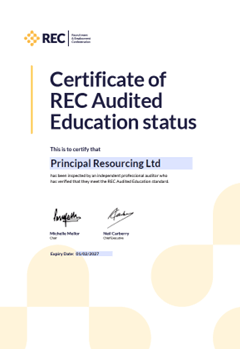Stepping into the classroom as an early career teacher (ECT) is a significant milestone. But as exciting as it is, your first teaching job can also be challenging. Balancing the workload, establishing your classroom presence, and managing expectations can sometimes feel overwhelming. But don’t worry—you’re not alone, and with the right tools and mindset, you can confidently navigate your early years.
Principal Resourcing understands the importance of early careers teachers and supports their new education careers. ECTs have a huge impact on improving education through their work in the classroom.
5 Top Tips for Your First Years in the Classroom
Don’t let your new career overwhelm you. Here are some practical tips and advice to help guide you through your first years in teaching.
1. Find Your Support System
Every teacher has been in your shoes at some point. The first thing to understand is that it’s perfectly okay not to have all the answers immediately. Every class and every school are different, so you learn a lot on the job. Make the most of the resources around you; a solid support system can make a huge difference.
- Colleagues: Don’t be afraid to ask for help from your colleagues. Whether you’re unsure about lesson planning, marking policies, or dealing with administrative tasks, most teachers will be happy to help. Building relationships with colleagues can also help you feel part of the school community.
- Online Communities: Widen your community with platforms like LinkedIn, which has many articles and posts from other experts. Look for specialised education forums as an excellent resource for advice and networking. You can connect with other ECTs and experienced teachers across the UK, sharing strategies, lesson ideas and moral support.
- Mentors: Principal Resourcing offers an in-house mentor to support you in your early years. Sessions with Principal Resourcing’s experienced ECT mentor are available on a 1-1 basis to talk through any areas of the curriculum or brush up on skills. Use your mentor as a sounding board for any concerns or questions. Your mentor will help if you are concerned about managing your workload, dealing with challenging behaviour or understanding the curriculum better. Your mentor is there to guide you, not judge you.
2. Develop a Routine That Works for You
Finding a balance between your teaching responsibilities and personal life is one of the biggest challenges for new teachers. It’s easy to get bogged down with marking, planning, and meetings, but developing a routine is important to help you stay fresh.
- Be Prepared: Make sure your classroom is set up for the day before your students arrive. Have your lesson plan in place and ready to go. Make the most of every minute that your students are in class. Preparation will stop you from feeling flustered and help you feel more confident.
- Prioritise Your Tasks: Not every task needs to be done immediately. Learn to prioritise what’s most important for that day or week. A marking pile might seem intimidating, but tackling it bit by bit—rather than in one marathon session—will keep it manageable.
- Create a Work-Life Balance: Set boundaries for when you’ll stop working. It’s tempting to take work home and continue planning lessons late into the evening, but this can lead to burnout. Set realistic daily goals and stick to them, ensuring you have time to recharge.

3. Build Your Classroom
An effective classroom is essential to creating a positive learning environment. As a new teacher, developing these skills takes time, but with patience and practice, you’ll get there.
- Be Consistent with Rules: Establish clear rules and expectations from day one. Students thrive on consistency, so ensure that rules are enforced fairly and regularly. This doesn’t mean being overly strict but setting boundaries that help maintain order in the classroom.
- Learn from Mistakes: Every teacher faces classroom challenges, whether managing disruptive behaviour, keeping students engaged, or dealing with low motivation. Reflect on what works and what doesn’t, and don’t be too hard on yourself when things don’t go to plan. It’s all part of the learning process.
- Celebrate Successes: Even the smallest accomplishments deserve recognition. Whether it’s a simple “well done” or sending a positive note home to parents, celebrating your students’ achievements helps boost their confidence. But celebrate your own successes, too – you deserve it!
4. Reflect on Your Performance
Self-reflection is a crucial part of your development as a teacher. Regularly take time to reflect on your lessons, classroom management and interactions with students. Self-assessment will help you identify what’s working and where you can improve.
- Log your experience: Write down your thoughts after each lesson or at the end of the week. This can help you process what went well and what didn’t. This doesn’t have to be a formal or time-consuming task; it could simply be bullet points or notes.
- Seek Feedback: Don’t hesitate to ask for feedback from your mentor, colleagues or even students. Constructive feedback can help you grow as a teacher and refine your techniques.
5. Embrace Continuous Professional Development (CPD)
The teaching profession is constantly evolving, and there’s always something new to learn. Engaging in CPD not only enhances your skills but also keeps you up to date with the latest developments in education.
- Attend CPD Sessions: Many schools offer in-house training sessions, but you can also explore external workshops or courses. Some teaching recruitment agencies, like Principal Resourcing, offer in-house CPD support. Principal Resourcing provides access to a range of certified courses with The National College. This provides opportunities to develop further in areas like behaviour management, subject-specific training or SEN support.
- Stay Updated on Educational Trends: Keeping up with the latest trends, policies and research can give you fresh insights into your teaching practice. Subscribe to education journals, follow educational thought leaders on social media, or join webinars that cover current issues in UK education.
- Use CPD to Set Career Goals: CPD isn’t just about improving your current practice—it’s also about shaping your future career path. As you progress in your early years, think about where you want to take your career, whether it’s moving into leadership, specialising in a particular subject, or focusing on pastoral care.

Principal Resourcing Supports Early Careers Teachers
Your first few years in teaching will be full of learning, growth and challenges. Principal Resourcing is one of the leading teaching recruitment agencies in Hull, Yorkshire and Lincolnshire. We help you with a strong support network to develop effective routines and a focus on continuous improvement.
As your experience grows, you’ll find that the challenges become easier to navigate. Most importantly, remember to enjoy the journey. Teaching is incredibly rewarding, and your impact on your students’ lives will make it all worthwhile.
Use the resources around and ask for help where you need it. Then, you can confidently navigate your early years and look forward to a long, fulfilling career in education. Speak to a member of the Principal Resourcing team to get your education career started.

